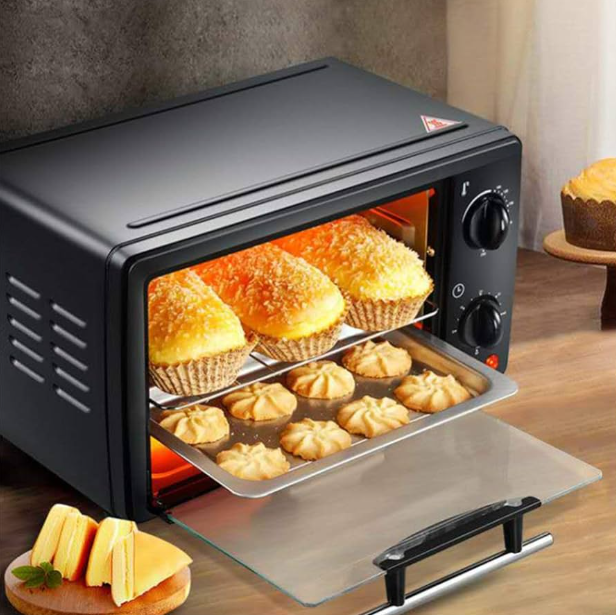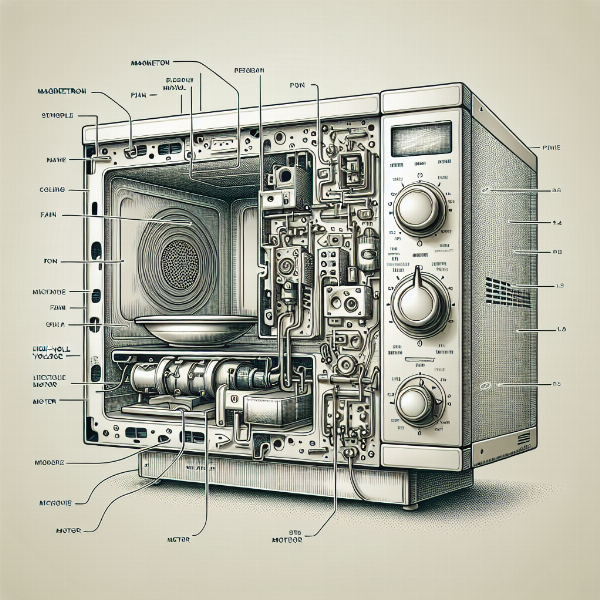That strange, unexpected noise coming from your kitchen appliance can be unnerving. One moment you’re heating leftovers, and the next, a loud buzzing or grinding sound fills the room. If you’re currently asking yourself, “Why Is My Microwave Oven Noisy?”, you’ve come to the right place. We’ve all been there, and the good news is that many of these sounds have simple explanations. Here at Microwave Oven Top, we’ll help you decode those sounds, identify the culprit, and figure out your next steps—whether it’s a quick DIY fix or a call to a professional.
First, Let’s Play Detective: What Kind of Noise Is It?
Not all microwave noises are created equal. The specific sound your oven is making is a major clue to what’s going on inside. Is it a constant hum, a rhythmic scraping, or an alarming buzz? Pinpointing the type of noise will help you narrow down the potential problems.
- Grinding or Scraping: This often points to an issue with the rotating parts.
- Loud Humming or Buzzing: This can indicate a problem with the electrical components that generate the microwaves.
- Rattling: This could be as simple as the turntable plate being misaligned.
- Unusually Loud Fan Noise: This points directly to the cooling fan.
Let’s dive into the most common reasons behind these sounds and what you can do about them.
Why Is My Microwave Oven So Noisy? 7 Common Culprits
From simple alignment issues to more serious electrical faults, here are the top reasons your microwave might be making a racket.
1. The Turntable or Roller Guide Is Misaligned
This is the most common—and thankfully, easiest to fix—source of microwave noise. If you hear a scraping, grinding, or thumping noise, the issue likely lies with the glass turntable tray or the roller ring it sits on.
- The Cause: The tray may have shifted off the roller guide, or food debris and grime could be stuck in the rollers, preventing them from turning smoothly.
- The Fix:
- Turn off and unplug the microwave.
- Remove the glass tray and the plastic roller guide beneath it.
- Clean both parts thoroughly with warm, soapy water.
- Wipe down the inside of the microwave, paying special attention to the area where the roller guide sits.
- Place the roller guide back in, ensuring it sits flat.
- Center the glass tray on top, making sure its grooves align with the turntable motor coupler in the center.
Expert Insight from Eleanor Vance, Seasoned Appliance Repair Technician:
“I’d say 9 times out of 10, a grinding noise is just the turntable. Before you panic, always give the tray and roller ring a good cleaning and make sure everything is seated correctly. It’s a five-minute fix that solves a world of noisy problems.”

A close-up view of a microwave turntable and roller ring, illustrating a common cause for why a microwave oven is noisy.
2. The Stirrer Motor Is Failing
The stirrer is a small, fan-like metal blade located at the top or side of the microwave cavity (often hidden behind a panel). Its job is to distribute the microwave energy evenly. If this motor starts to wear out, you might hear a rhythmic scraping or grinding noise as it struggles to turn.
- The Cause: Wear and tear on the motor’s gears or bearings.
- The Verdict: This is a more complex repair. While the part itself isn’t expensive, accessing it requires disassembling part of the microwave’s casing. We recommend calling a professional for this.
3. The Magnetron Is on Its Way Out
The magnetron is the heart of your microwave; it’s the component that generates the microwaves to heat your food. When it begins to fail, it can produce a very distinct and alarming sound.
- The Telltale Sound: A loud, angry humming, buzzing, or even a growling sound that is significantly louder than the normal operating hum. You might also notice your food isn’t heating properly.
- The Cause: The magnetron is a high-power vacuum tube that wears out over time.
- The Verdict: This is not a DIY job. The magnetron is part of the microwave’s high-voltage system. Tampering with it is extremely dangerous. If you suspect a failing magnetron, unplug your microwave immediately and call a certified technician.
4. A Faulty High-Voltage Diode
The diode works with the capacitor to power the magnetron. If the diode burns out, it can cause a similar sound to a failing magnetron.
- The Telltale Sound: A loud buzzing or humming noise, often accompanied by a lack of heating.
- The Cause: The diode has shorted out or failed.
- The Verdict: Just like the magnetron, this is a high-voltage component. For your safety, this repair should only be handled by a professional.
Expert Insight from David Chen, Microwave Design Engineer:
“The sounds from a failing magnetron or diode are unmistakable and much more intense than a normal hum. These components handle thousands of volts. My best advice is to treat these sounds as a serious warning sign: stop using the appliance and seek professional service.”

An exploded view of a microwave’s internal parts like the magnetron and cooling fan, which can explain why your microwave oven is noisy.
5. The Drive Motor Is Worn Out
The drive motor, or turntable motor, is the small motor that sits beneath the floor of the microwave and turns the turntable. When it starts to fail, it can make a grinding or whining noise during operation.
- The Cause: The motor’s internal gears have worn down over years of use.
- The Verdict: While it’s possible for a skilled DIYer to replace this part, it involves turning the microwave over and removing a bottom panel. If you’re not comfortable with this, a technician can do it quickly.
6. The Exhaust or Cooling Fan Is Obstructed
Your microwave has a fan to cool the magnetron and, in over-the-range models, to act as an exhaust fan for your stovetop. If this fan blade is loose, damaged, or obstructed, it will create noise.
- The Telltale Sound: An unusually loud, whirring or rattling sound, like a fan hitting something.
- The Cause: A piece of debris may have gotten into the fan housing, or the fan motor itself could be failing.
- The Verdict: Unplug the unit. You may be able to see the exhaust fan and check for simple obstructions. However, accessing the internal cooling fan requires disassembly, so it’s best to call a pro for a thorough inspection.
7. It’s Just… Normal Operation
Sometimes, what seems like a loud noise is simply the normal sound of a powerful appliance. Newer models, especially inverter microwaves, can produce different hums and clicks than older models. If your microwave is new and heating food perfectly, the sound might just be its standard operating noise.
Conclusion: Don’t Ignore the Noise
Figuring out why is my Microwave Oven noisy is the first step toward a quiet and efficient kitchen. While some sounds are harmless indicators of a misaligned turntable, others—like a loud, menacing buzz—are serious warnings that demand immediate attention. Always prioritize safety: if you suspect a problem with the magnetron, diode, or any other internal electrical part, unplug the unit and call a professional. By listening to your appliance and following this guide, you can confidently diagnose the issue and get back to enjoying the quick, convenient cooking your microwave provides.
Frequently Asked Questions (FAQ)
1. Is it safe to use a microwave that is making a loud noise?
It depends on the noise. If it’s a simple scraping from a misaligned turntable, it’s generally safe. However, if you hear a loud humming, buzzing, or grinding noise, stop using it immediately and unplug it. These sounds can indicate a serious electrical fault with high-voltage components, which could be a safety hazard.
2. Why is my microwave making a buzzing noise after it’s finished cooking?
This is usually the sound of the internal cooling fan. After a cooking cycle, the fan may continue to run for a few minutes to cool down the magnetron and other electronics, which is completely normal.
3. How much does it cost to fix a noisy microwave?
The cost varies wildly. A simple fix, like replacing a turntable motor, might cost between $100-$150. However, if the magnetron is the problem, the repair cost could be $200 or more, at which point it’s often more economical to buy a new microwave.
4. Can I fix a noisy microwave myself?
You can safely fix simple issues like cleaning and realigning the turntable and roller guide. For any repair that requires opening the microwave’s cabinet, we strongly recommend hiring a certified technician due to the risk of electric shock from high-voltage components, even when unplugged.
5. Why is my brand-new microwave so loud?
Newer microwaves, especially convection or inverter models, can have more powerful fans and different operating sounds than older units. If it’s heating correctly and the noise is a consistent hum or whir, it’s likely just the normal sound of your specific model. Check your user manual or online reviews to see if other owners report similar noise levels.